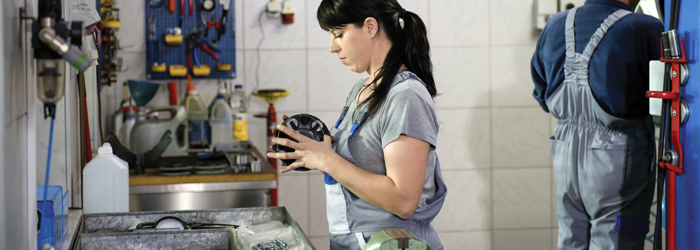Parts washers are standard equipment in automotive, farm, and other mechanical repair facilities.
These machines use solvents or water-based solutions to clean parts and other mechanical components. Even though safe solvents have replaced most highly flammable solvents, some are still dangerous and pose a fire hazard and care must be taken when using these machines.
Manufactured parts washers are equipped with a number of safety features to reduce the risk of fire. These include a self-closing hinged lid that is held open by a fusible link that melts at a specific temperature. Should a fire develop, the fusible link will melt and the lid will automatically close to confine and smother the fire.
If you operate a parts washer that uses solvents in your business, the following tips will help to reduce the risk of fire:
- Use only commercially produced, purpose-built parts washers listed by a recognized testing laboratory such as UL/ULC, FM or CSA having covers equipped with automatic devices such as a fusible link or other heat sensitive device.
- Inspect the fusible link frequently to ensure it is in good condition.
- Inspect the self-closing lid to ensure it is functioning properly.
- Use only high-flash point solvents in line with the manufacturer’s instructions for the listed equipment.
- Parts should not be stacked too high to prevent the lid from closing.
- When not in use, the lid should be closed.
- All parts washing operations should be performed away from hot work areas to prevent sparks from entering the unit.
The best preventative measure however is to use a water-based parts washing system. They provide a fire-safe alternative for many applications and reduce the hazards of volatile organic compounds to workers and the environment.




